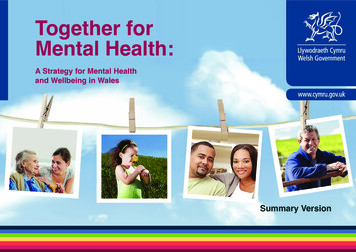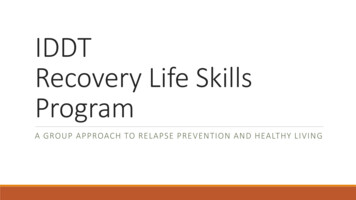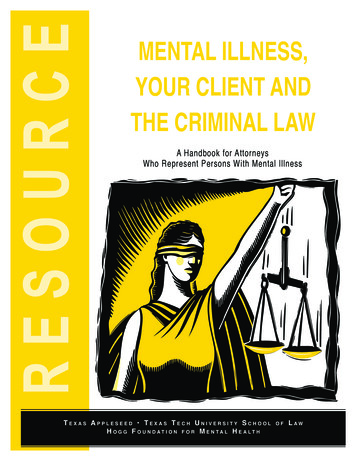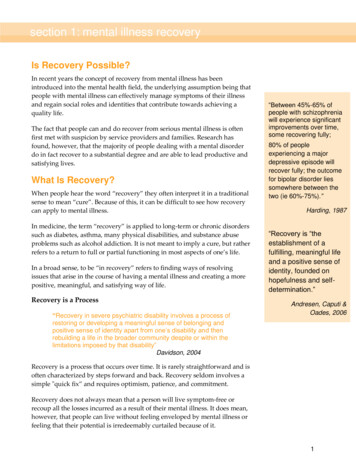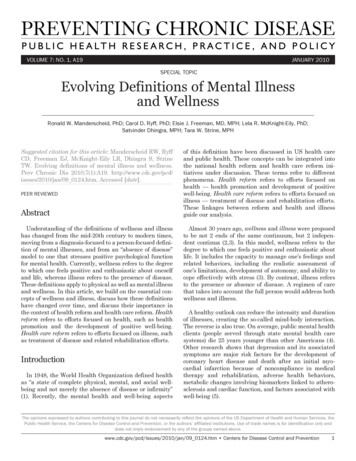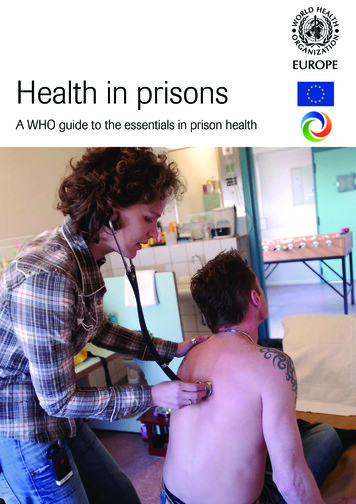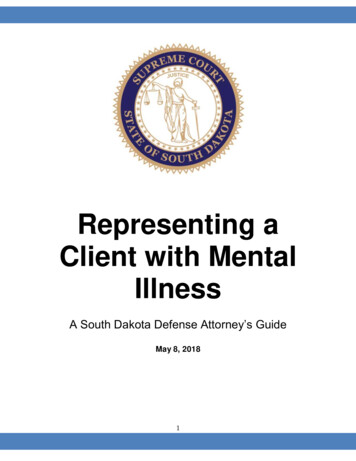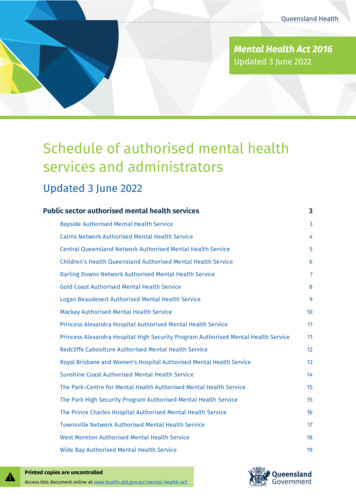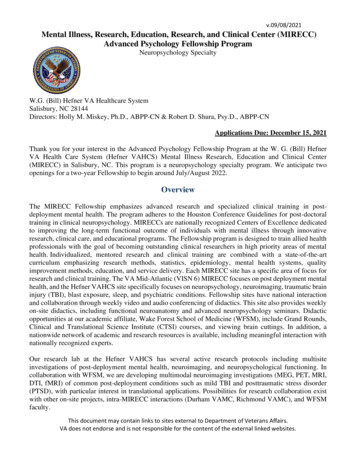
Transcription
v.09/08/2021Mental Illness, Research, Education, Research, and Clinical Center (MIRECC)Advanced Psychology Fellowship ProgramNeuropsychology SpecialtyW.G. (Bill) Hefner VA Healthcare SystemSalisbury, NC 28144Directors: Holly M. Miskey, Ph.D., ABPP-CN & Robert D. Shura, Psy.D., ABPP-CNApplications Due: December 15, 2021Thank you for your interest in the Advanced Psychology Fellowship Program at the W. G. (Bill) HefnerVA Health Care System (Hefner VAHCS) Mental Illness Research, Education and Clinical Center(MIRECC) in Salisbury, NC. This program is a neuropsychology specialty program. We anticipate twoopenings for a two-year Fellowship to begin around July/August 2022.OverviewThe MIRECC Fellowship emphasizes advanced research and specialized clinical training in postdeployment mental health. The program adheres to the Houston Conference Guidelines for post-doctoraltraining in clinical neuropsychology. MIRECCs are nationally recognized Centers of Excellence dedicatedto improving the long-term functional outcome of individuals with mental illness through innovativeresearch, clinical care, and educational programs. The Fellowship program is designed to train allied healthprofessionals with the goal of becoming outstanding clinical researchers in high priority areas of mentalhealth. Individualized, mentored research and clinical training are combined with a state-of-the-artcurriculum emphasizing research methods, statistics, epidemiology, mental health systems, qualityimprovement methods, education, and service delivery. Each MIRECC site has a specific area of focus forresearch and clinical training. The VA Mid-Atlantic (VISN 6) MIRECC focuses on post deployment mentalhealth, and the Hefner VAHCS site specifically focuses on neuropsychology, neuroimaging, traumatic braininjury (TBI), blast exposure, sleep, and psychiatric conditions. Fellowship sites have national interactionand collaboration through weekly video and audio conferencing of didactics. This site also provides weeklyon-site didactics, including functional neuroanatomy and advanced neuropsychology seminars. Didacticopportunities at our academic affiliate, Wake Forest School of Medicine (WFSM), include Grand Rounds,Clinical and Translational Science Institute (CTSI) courses, and viewing brain cuttings. In addition, anationwide network of academic and research resources is available, including meaningful interaction withnationally recognized experts.Our research lab at the Hefner VAHCS has several active research protocols including multisiteinvestigations of post-deployment mental health, neuroimaging, and neuropsychological functioning. Incollaboration with WFSM, we are developing multimodal neuroimaging investigations (MEG, PET, MRI,DTI, fMRI) of common post-deployment conditions such as mild TBI and posttraumatic stress disorder(PTSD), with particular interest in translational applications. Possibilities for research collaboration existwith other on-site projects, intra-MIRECC interactions (Durham VAMC, Richmond VAMC), and WFSMfaculty.This document may contain links to sites external to Department of Veterans Affairs.VA does not endorse and is not responsible for the content of the external linked websites.
v.09/08/2021Supervised clinical activities are offered in our Neuropsychology Outpatient Clinic, ADHD Clinic,Community Living Center (Geropsychology), and the Cognitive Rehab rotation which includes theFunctional Adaptation and Cognitive reTraining (FACT) and SmartThink cognitive rehabilitationprograms, as well as ADHD Group and individual rehab. Fellows may choose to arrange additional trainingexperiences in conjunction with other programs including the Inpatient Psychiatric Unit, PTSD ResidentialRehabilitation Treatment Program (PTSD-RRTP), Neurology department, or WFSM. Although thisFellowship is research-focused, it is designed to meet clinical supervision and training requirementsconsistent with NC psychology licensure and with the Houston Conference Guidelines for ClinicalNeuropsychology.Fellows devote the majority of their time to clinical research and approximately 25% to direct patientclinical care. In collaboration with their mentors, Fellows develop and implement research projects, publishand present findings, participate in grant writing, and utilize the latest technology for educational activitiesand clinical service delivery. Career development is also emphasized. With mentor support and guidance,Fellows are expected to develop a 2 to 5-year career trajectory beyond formal postdoctoral training.Guiding PrinciplesThe structure and activities of the Fellowship program are designed to meet the guidelines established bythe American Psychological Association, the Houston Conference Guidelines, and the VA Guidelines forPostdoctoral Programs. More information about the MIRECC Advanced Fellowship Program can be foundat https://www.mirecc.va.gov/mirecc fellowship.asp and in the following article:O'Hara, R., et al. (2010). Increasing the Ranks of Academic Researchers in Mental Health: AMultisite Approach to Postdoctoral Fellowship Training. Academic Medicine, 85, 41–47.Training SettingThe Hefner VAHCS in Salisbury, North Carolina provides inpatient and outpatient medical and psychiatriccare. We house a 35-bed Substance Abuse Residential Rehabilitation Treatment Program (SARRTP) and a23-bed PTSD-RRTP/Virtual Intensive Outpatient Program for PTSD (VIOPP). The 120-bed CommunityLiving Center (CLC), comprised of short-term rehabilitation units, long-term care units, and a Hospice unit,recently received a 5-star rating. We are a designated Center of Excellence for Mental Health as well asGeriatrics. We have maintained an academic affiliation with Wake Forest School of Medicine (WFSM)since 1995. In 2006, the medical center also affiliated with the Edward Via College of Osteopathic Medicine(VCOM) at Virginia Tech University. Additionally, the Hefner VAHCS catchment area includes two newHealthcare Centers (HCCs) in Charlotte and Kernersville, as well as one Community-Based OutpatientClinic (CBOC) in Charlotte.The Hefner VAHCS has been consistently ranked as one of the top five growing VAs in the nation. Between2000 and 2018, the number of total Veterans seen by the medical center increased from 31,515 to 104,000.In FY 2021, the medical center provided over 800,000 outpatient visits to over 90,000 unique Veterans.This is a 21% increase in the number of outpatient visits and greater than 10% increase in number of uniqueVeterans from the prior year. Patient demographics are reflective of the areas served. North Carolina Censusdata (2017) reveal that the approximate population diversity by race is 21 percent African American/ Black,1 percent American Indian, 2 percent Asian, 8 percent Hispanic or Latinx, and 68 percent White. Our currentThis document may contain links to sites external to Department of Veterans Affairs.VA does not endorse and is not responsible for the content of the external linked websites.
v.09/08/2021Veteran demographics reveal that the population served is approximately 30 percent African American/Black, 0.4 percent American Indian, 0.3 percent Asian, 0.4 percent Pacific Islander/ Hawaiian, 6 percentunknown/declined and 63 percent White. The majority of Veterans served are male, but the female patientpopulation is growing rapidly at 11% of new enrollees.The Mental Health and Behavioral Sciences (MH&BS) service line has over 250 staff in multiple disciplinesincluding nurses, psychologists, psychiatrists, social workers, licensed therapists, and peer supportspecialists, among others. Psychology has over 65 doctoral-level psychologists, two psychometrists, andseveral administrative assistants. Six psychologists are credentialed in neuropsychology, and three arecurrently board certified (two through ABPP and one through ABN). MH&BS also offers a one-year APAaccredited Clinical Psychology Residency Program (two positions), an APA accredited internship with sixpositions (including a neuropsych track), and several psychology practicum student rotations. The MIRECCis housed in the Research and Academic Affairs (R&AA) service line, which offers one additional MIRECCmedical Fellowship position. In previous years, this position has been held by neurology or pharmacology.We additionally host medical residents (psychiatry, pharmacology, neurology, etc) and trainees fromprograms including WFSM and VCOM.Training Goals and ActivitiesEvaluationAt the beginning of the first year, Fellows complete a written Self-Assessment which guides the trainingplan. The Self-Assessment allows Fellows to tailor their learning experiences to best meet their individualtraining needs, while also providing sufficient structure to ensure successful completion of training goals.Together with one of the co-Directors, Fellows will develop an Individual Development Plan (IDP) thatwill be updated throughout the two-year program, which guides individual training needs and goals.Program's Evaluation of FellowSupervisors and Fellows are expected to exchange feedback routinely as a normal part of their dailyinteractions. On a semester basis (six months), each Fellow receives a written evaluation of theirperformance in the Fellowship; quarterly evaluations (approximately three months) are provided in verbalform. The written feedback is structured to match the individualized learning goals and objectives andincludes written feedback from clinical supervisors and the research mentor(s). Feedback is expected to beas specific as possible and communicated in a respectful manner. The Training Director and Fellow discussthe formal evaluation, and both sign it before it is placed in the Fellow's training file. The Training Directorand the Fellow meet and collaboratively assess progress toward achieving goals and objectives in the nextsemester and revise or remediate as needed. If a Fellow is at risk of not meeting training requirements forprogram completion, or performs below expectations on any given skill, a Performance Improvement Planwill be designed with specific and measurable goals and will be re-evaluated at set timepoints. Fellowsreceive a copy of the Fellowship Training Manual which provides additional detail about evaluationincluding due process procedures for problem identification and resolution (e.g., probation for unethicalbehavior). Additionally, each Fellow meets with one training Director for an hour each week to discussprogress through the program, administrative issues, and any topics relevant to progress in clinical andresearch goals; this is beyond regular clinical supervision and research mentor meetings.Fellow's Evaluation of ProgramA formal system of evaluation is used for Fellows to provide feedback on their clinical, supervisory,mentorship, and overall Fellowship program experience. The Fellows complete formal rating scales of theirThis document may contain links to sites external to Department of Veterans Affairs.VA does not endorse and is not responsible for the content of the external linked websites.
v.09/08/2021experience in clinical rotations and in the overall Fellowship every semester (6 months) and at the end ofthe training program to rate their satisfaction with the training experiences, outcomes, quality of supervisionprovided, didactic experiences, research involvement, and facilities and resources available. The Fellowand clinical supervisor meet to discuss and sign evaluations of both the supervisor and Fellow prior to beingsubmitted to the Training Directors. A copy is provided to the Training Directors as a means of monitoringprogram quality. The Training Directors and Fellow will review the Fellow’s ratings and workcollaboratively to address any areas of concern. Fellows are encouraged to provide informal input andfeedback as a routine part of the supervision process, in their weekly meetings with their research mentor(s),and in weekly meetings with the Training Directors. In addition, Fellows complete evaluations after eachseminar (Functional Neuroanatomy and Advanced Neuropsychology).Research TrainingFellows devote a substantial amount of time to research-related activities. This includes educationalactivities (didactics and seminars) and administrative activities (required meetings), although at least 25%of this time is expected to be devoted to research. Fellows are expected to participate in ongoing researchactivities at the Hefner VAHCS, MA-MIRECC, and WFSM. To successfully complete the program,Fellows are required to:1. Submit a minimum of four publications (two as first author) using existing or new datasets2. Submit a grant application (typically for a small pilot study)3. Actively participate in existing, ongoing data collection and research activities, including runningan average of one research participant weekly4. Present research findings to psychologists, psychiatrists, social workers, and nurses at the HefnerVAHCS Mental Health Grand Rounds in July of each yearFellows additionally have the opportunity to design, develop, and conduct their own research projects.Research Training ActivitiesResearch mentorship provides Fellows the opportunity to learn from established local investigators andinvestigators from the local research community, the network of VISN-6 MIRECC investigators, or VAinvestigators across the nation. Both the Hefner VAHCS and WFSM offer the opportunity to participate inlocal and broadcast lectures on state-of-the-art research methods. The MIRECC Advanced Fellowshipprogram's video teleconferencing system provides opportunities for weekly didactics including seminars ongrant writing, biostatistics, bioethics, and career development.The Hefner VAHCS has excellent research infrastructure including an on-site institutional review board(IRB) and the Salisbury Foundation for Research and Education, a non-profit organization that supportsgrant management and other research activities. There are opportunities to collaborate with other VA andWFSM investigators who focus on specific domains of post-deployment health such as TBI and PTSD,innovative technology-based approaches to training clinical expertise, non-human primate translationalscience studies, and application of advanced neuroimaging techniques in the study of mild TBI or blastexposure. Fellows gain access to VA Informatics and Computing Infrastructure (VINCI) which providesaccess to analytic software (SAS, R, etc.). MIRECC-specific resources include statistical consultation andaccess to multiple archival data sets. Fellows apply for an academic appointment at our affiliate, WFSM.This provides the opportunity to audit select classes, access library resources and electronic articles, andthe potential for research collaborations.This document may contain links to sites external to Department of Veterans Affairs.VA does not endorse and is not responsible for the content of the external linked websites.
v.09/08/2021Research Team Meetings: The research team includes research neuropsychologists, a neuroscientist,psychometrists, research assistants, clinician-researchers, and Fellows. Active studies meetings are held toupdate on procedural aspects of ongoing studies, and Writing meetings are held regularly for updates onpublication and grant drafting processes. During Writing meetings, team members plan new manuscripts,propose new manuscript ideas, solicit help on issues with writing, and present manuscript drafts to receivefeedback from the team.Professional Meetings: Fellows are encouraged to attend professional meetings and conventions of theirchoice as a means of participating in the larger professional world, and of pursuing individual professionalinterests. Fellows are also expected to present research data (e.g., poster, oral presentation, symposia) atnational or international professional meetings or conferences. The Fellowship program provides a stipendof 1000 for authorized travel to professional meetings annually. Authorized absence may be granted forsuch activities in an amount comparable to other Psychology staff. Absences for such meetings must benegotiated with the supervisor and submitted for approval.Clinical TrainingFellows spend approximately 25% of their time in supervised direct patient clinical care. Primary goalsinclude:1. Employ current evidence-based assessment and/or treatment to enhance patient care2. Provide education and training to more junior psychology trainees through in-service lectures,Grand Round presentations, and direct clinical supervision3. Receive training in complex ethical and medicolegal issues unique to VA clinical work and research4. Meet eligibility criteria for ABPP Board Certification in Clinical NeuropsychologyClinical Training ActivitiesFellows complete six-month rotations and are permitted to repeat rotations, provided the experience willresult in additional growth and skill development. Fellows identify one particular area of interest under theumbrella of Neuropsychology and complete clinical rotations reflective of their clinical and researchinterests, and learning needs as determined by the Fellowship Directors and mentor team. Often, clinicalresearch activities also apply toward state licensure residency requirements.Fellows receive at least two hours per week of individual, face-to-face, or video supervision, conducted bylicensed psychologists with expertise in the areas being supervised. Fellows receive supervision from atleast two psychologists during each training year. Supervision provided is relevant to the actual clinicalservices rendered by the Fellow. Fellows take responsibility for tracking aggregate clinical hours towardslicensure. If licensure in a state other than North Carolina is desired, applicants are encouraged to ensurethat the supervision offered at Hefner is sufficient for licensure prior to application. Fellows may choose toapply for licensure in their preferred state and are strongly encouraged to begin the application processduring their fellowship.Staff Meetings: Fellows attend the monthly Psychology Service staff meetings (2nd Friday of each month,11:00 am to 12 noon), Research & Academic Affairs staff meetings (2nd Tuesday of each month, 2:00 pmto 3:00 pm), and the unit(s) or services on which they work.Instruction and Supervision of Other Trainees: Fellows frequently provide neuropsychological consultationto other providers in Psychology or Psychiatry. Fellows present two teaching case presentations per yearfor the intern didactic series, intended to educate interns on neuropsychological conditions. Fellows mayThis document may contain links to sites external to Department of Veterans Affairs.VA does not endorse and is not responsible for the content of the external linked websites.
v.09/08/2021also engage in additional intern didactics based on Fellow interests. Additionally, there may beopportunities for Fellows to clinically supervise interns rotating on the neuropsychology rotation, in astructured manner and under the guidance of the supervising neuropsychologist. This usually occurs duringthe second year.Available Clinical RotationsNeuropsychology Rotation: The Neuropsychology Rotation is the principal rotation for Fellows. If aFellow plans to pursue board certification in neuropsychology, this rotation is repeated and individualizedover the 2 years of Fellowship by focusing on different populations, different theroetical approaches toassessment, and mentorship by different neuropsychologists. The Neuropsychology Clinic is an outpatientconsult service, although participation in team-based treament planning is also possible. Cases include awide range of CNS disorders, health conditions, and injuries, and patients range from newly dischargedIraq and Afghanistan-era Veterans to elderly Veterans. At a minimum, Fellows administer and scoreinstruments, interpret test data, write reports, and conduct feedback sessions. Ample opportunity exists tointerface with other disciplines (such as Psychiatry, Neurology, or Psychopharmacology). There isoppurtunity to develop individual foci, especially during the second year, based on interest. For example,past Fellows have incorporated teleneuropsychology and disability evaluations based on career goals.Fellows are expected to work towards assuming the role of “expert,” and to proivde consultation to otherPsychology staff.Cognitive Rehabilitation: On this outpatient rotation, fellows implement cognitive rehabilitationtechniques with Veterans in individual and group formats. Cognitive Rehabilitation focuses on teachingand implementing compensatory strategies to improve daily functioning. Groups are designed to providepsychoeducation about cognition, instruction on compensatory strategies, and homework to reinforce skills.Individual session focus on tailoring strategies and techniques to target weaknesses. Veterans range in ageand present with a variety of conditions including mild/major neurocognitive disorder, TBI/PTSD, andADHD, and older Veterans who would like to learn more about the cognitive aging process and strategiesfor successful aging. Available experiences include FACT, SmartThink, a Managing ADHD in Adulthoodgroup, and individual patients as available. The FACT (Functional Adaptation and Cognitive re-Training)program is a multidisciplinary team intervention designed for Veterans with a concussion or mild/moderatebrain injury who continue to have cognitive complaints. Small groups focus on compensatory strategies,psychoeducation, social comprehension and skill development, and vocational skills. The second FACTprogram is SmartThink. It is a large group available to any Veteran who would like to improve memory,attention, or other cognitive function. It covers 6 modules including Healthy Brain, Sleep, Attention, HowMemory Works, How to Improve Memory, and Problem Solving.Geropsychology and Home Based Primary Care: In the inpatient Community Living Center (CLC)setting, Fellows have the opportunity to complete cognitive and capacity evaluations for veteransrehabilitating from illness, stroke, surgery, injury, or hospitalization. Alternatively, Fellows can providebrief therapy to Veterans in Hospice (e.g., end-of-life issues), long term care (e.g., depression, behavioraldisturbances), or rehabilitation (e.g., adjusting to amputation/diagnosis, motivational interviewing forhealthful behaviors). They work in multidisiciplinary teams, provide education, develop behaviormodification plans through the STAR-VA program, and develop recommendations for treatment ordischarge planning. This is a fast-paced environment that fosters skill development in brief bedsideassessment, concise report writing, a fast turnaround, a team approach, and presentation of results to otherdisciplines. For those wishing to pursue board certification in neuropsychology, this is a recommendedrotation and can be tailored specifically towards neuropsychological evaluations.This document may contain links to sites external to Department of Veterans Affairs.VA does not endorse and is not responsible for the content of the external linked websites.
v.09/08/2021Outpatient geropsychology training is also available through the Home Based Primary Care (HBPC)program. Fellows provide assessment or psychological services to elderly and disabled Veterans in theirhomes. This unique opportunity will allow the Fellow to function as part of an interdisciplinary team andto make in-home visits with the HBPC staff psychologist.Acute Psychiatry: An inpatient psychiatric unit totaling 46 beds provides short-term inpatient treatmentfor a variety of mental health conditions. Fellows attend interdisciplinary treatment team meetings andprovide consultation. Fellows will primarily provide psychological or brief cognitive evaluations (e.g.,diagnostic, cognitive screening, capacity, etc), though there is opportunity for group therapy andpsychoeducation classes.Other Rotations: Other clinical rotations are available based on the Fellow’s training goals, such as in theOutpatient Mental Health Clinic, Posttramuatic Stress Disorder Clinical Team, PTSD ResidentialRehabilitation Treatment Program, Substance Abuse Residential Rehabilitation Treatment Program,Primary Care Mental Health Integration, and Whole Health. Fellows are expected to function as anadvanced psychology trainee in selected rotations, and may thus also be involved in supervising more juniortrainees as available. Additionally, Fellows will need to tailor specific rotations towards advancedneuropsychology training. Fellows may also develop new rotations consistent with their training goals atthe discretion of the Training Director.Education and Career DevelopmentEducational goals include learning opportunities, teaching activities, and dissemination of researchfindings. Opportunities include VA Grand Rounds, VA online seminars, VA clinical training workshops,mandatory MIRECC Advanced Fellowship video teleconference seminar series ("V-Tels"), observation ofbrain cuttings at WFSM as available, and formal coursework offered by WFSM. WFSM was recentlyawarded a prestigious Clinical Translational Science Award to develop a Clinical Translational ScienceInstitute (CTSI). The CTSI is part of a consortium of 60 similar programs funded through NIH to acceleratetranslational discoveries through a variety of mechanisms, including significant educational and trainingopportunities. The CTSI offers significant support specifically to early career investigators, including aTranslational Research Academy, study coordinator pool, Research Navigators, biostatistical support, andtwo internal KL2 funding lines. Primary educational goals for Fellowship include:1. Developing a firm knowledge base regarding recent developments in translational research as itrelates to post-deployment mental health2. Complete at least one Grand Rounds presentation, in-service training, intern didactics, or otherappropriate venue3. Present research at a regional, national, or international scientific meetingMIRECC Fellowship Seminar SeriesThe MIRECC Advanced Fellowship program videoconference seminar series ("V-Tels") offers Fellows abroad range of topics including state-of-the-art research methodologies, biostatistics, intervention andservices research, quality improvement methods, grant funding, grant writing workshops, and careerdevelopment. These weekly seminars are mandatory for Fellows (at least two per month).Advanced Seminar SeriesSeminars meet on Wednesdays from 3:00-4:30 PM. Other postdoctoral residents (clinical psychology),medical residents (neurology, psychiatry, pharmacology, and rehab), and predoctoral interns are invited toThis document may contain links to sites external to Department of Veterans Affairs.VA does not endorse and is not responsible for the content of the external linked websites.
v.09/08/2021attend, but seminars are structured for the postdoctoral level and for Houston Guidelines for BoardCertification. Fellows contribute to development of the scheduled topics and invited speakers, dependingon group and personal need. Fellows are provided with readings relevant to each topic and are expected toarrive prepared to actively participate in discussion.Advanced Neuropsychology Seminar: meets on the 2nd and 4th Wednesdays. Topics are variedbut are related to the practice of neuropsychology and include mock American Board of ClinicalNeuropsychology (ABCN) Fact Finding practice.Functional Neuroanatomy Seminar: meets on the 1st and 3rd Wednesdays.Diversity V-TelA monthly Diversity Video-Teleconference (V-Tel) is offered solely to post-doctoral residents by aconsortium of 12 VAHCSs around the country. Each month, a presentation and discussion focus on adifferent aspect of diversity. MIRECC Fellows are required to attend a total of 2 of these V-Tels acrosstheir 2 years of fellowship.Ethics TrainingFellows are required to complete 2 ethics trainings outside the context of the above training activities.Typically, there is a yearly Area Health Education Centers (AHEC) Program training sponsored by theVAHCS that is free of charge. Other options may include online CE experiences and workshops or sessionsat conferences and meetings.Training Activities During COVID-19COVID-19 led to significant alterations for the 2019-2021 academic years. In response, Fellows wereprovided with resources including VA issued laptops to tele-work and continue research, education, andclinical work with minimal disruption. Outcomes affected included conference cancellations or migrationto virtual conferences; use of tele-health modalities for clinical assessments; modification to researchstudies; and a 100% remote education plan for seminars, meetings, and didactics. We will continue withmodifications as long as directed/appropriate and have been encouraged by our ability to continueproviding high quality training while at the same time provisioning tele-work to increase safety ofFellows and Veterans. At this time, Fellows are permitted to tele-work three days/week.Research Activities:At the time of writing, we have resumed active recruitment of research participants.Clinical Activities:We continue to see patients in multiple modalities including over video tele-health, in person, and ahybrid model integrating use of video technology and in-person testing. When possible, we completelonger evaluations in larger group rooms. Plexiglass barriers, face shields, clinic iPads, and hospital gradesanitizing wipes are available for use. All staff and trainees are provided with medical masks andmandated to wear them while indoors on federal grounds. We additionally provide N95 mask fittings.This document may contain links to sites external to Department of Veterans Affairs.VA does not endorse and is not responsible for the content of the external linked websites.
v.09/08/2021Requirements for CompletionFor Fellows to successfully complete the program, they must complete all of
W.G. (Bill) Hefner VA Healthcare System Salisbury, NC 28144 Directors: Holly M. Miskey, Ph.D., ABPP-CN & Robert D. Shura, Psy.D., ABPP-CN . Clinic (CBOC) in Charlotte. The Hefner VAHCS has been consistently ranked as one of the top five growing VAs in the nation. Between 2000 and 2018, the number of total Veterans seen by the medical center .
